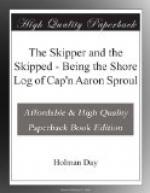When the Colonel had untangled himself from the indignant seamen and had escaped up the ladder, Cap’n Sproul was pelting up the wharf at a most amazing clip, considering his short legs. Before Ward had fairly gathered himself for the chase his fifteen-thousand-dollar check and the man bearing it had disappeared around a corner into the street.
But the squat and stubby old sailor stood little show in a foot-race with his gaunt and sinewy adversary. It was undoubtedly Colonel Ward’s knowledge of this that now led him to make the race the test of victory instead of depending on an interpreter over the telephone. A little more than a block from the wharf’s lane he came up with and passed his adversary. Men running for trolley-cars and steamboats were common enough on the busy thoroughfare, and people merely made way for the sprinters.
But when Colonel Ward was a few lengths ahead of the Cap’n, the latter made use of an expedient that the voiceless Colonel could not have employed even if he had thought of it.
With all the force of his seaman’s lungs he bellowed: “Stop thief!” and pounded on behind, reiterating the cry vociferously. At first he had the pursuit all to himself, for bystanders merely ducked to one side. But earnest repetition compels attention, and attention arouses interest, and interest provokes zeal. In a little while a dozen men were chasing the Colonel, and when that gentleman went lashing around the corner into Congress Street he—by an entirely natural order of events—ran into a policeman, for the policeman was running in the opposite direction to discover what all that approaching hullabaloo was about.
Cap’n Sproul, prudently on the outskirts of the gathering crowd, noted with rising hope that the policeman and the Colonel were rolling over each other on the ground, and that even when officious hands had separated them the facial contortions of the voiceless tyrant of Smyrna were not making any favorable impression on the offended bluecoat.
Cap’n Sproul started away for the bank at a trot. But he began to walk when he heard the policeman shout: “Aw, there’s enough of ye’r moonkey faces at me. Yez will coome along to th’ station, and talk it on yer fingers to th’ marshal!”
At the bank door the Cap’n halted, wiped his face, composed his features, set on his cap at an entirely self-possessed angle, and then marched in to the wicket.
“Will you have this transferred to your account, Captain Sproul?” inquired the teller, with the deference due to a good customer.
The Cap’n anxiously bent a stubbed finger around a bar of the grating. Sudden anxiety as to leaving the money there beset him. After his perils and his toils he wanted to feel that cash—to realize that he had actually cashed in that hateful check.
“I’ll take the real plasters,” he said, huskily; “big ones as you’ve got. I—I want to pay for some vessel property!” He reflected that the few hundreds that the loss of the ancient Dobson called for lifted this statement out of the cheap level of prevarication.




